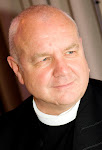Eucharist and Life
‘Very truly, I tell you, unless you eat the flesh of the Son of Man and drink his blood, you have no life in you.’ John 6.53
It’s a very stark statement of our Lord - “no life in you”. It has led the church into great debates which have largely missed the point of the words. But then the church is good at great debates that largely miss the point...
This verse became a proof text for receiving the Eucharist in 2 kinds: bread and wine. It encouraged the practice of feeding the sacraments to babies, lest they die with no life in them.
But what is the life that Jesus speaks of here and how do we receive it?
These verses 51- 58 from John 6, form a later, cogitated part of John’s teaching, already beginning to reflect early church eucharistic practice.
It is always difficult in John’s discourses to tell where the words of Jesus end, and where the pondered theology of John begins. And often the words of Jesus are selected from different times in his ministry and then run together thematically.
In fact the earlier verses from 35 - 50 form the backbone of our Lord’s teaching, and so help us to understand our text in its context. Raymond Brown, the great Roman Catholic commentator on John puts it this way:
“The juxtaposition of the two forms of the discourse teaches that the gift of life comes through a believing reception of the sacrament” (cf.47 - “he who believes has eternal life.”) (Raymond Brown p.292)John is stressing that Christian mystery is not pagan mystery, nor is it like the magic of the Jewish gnostic cults. There is no hocus pocus, no hoax (which despite most lexicographers who think the phrase derives from the magician’s nonsense bit of dog-Latin hax pax max Deus adimax, I and others think comes from the words of the Latin Mass, hoc est corpus meum - hocus pocus).
The church has spent much of the last 500 years arguing over what actually happens in the Eucharist.
Transubstantiation was the doctrine developed most fully by St Thomas Aquinas in the 13thC: the conversion of the Bread & Wine into the Body & Blood of our Lord, only the ‘accidents’ (appearances of bread & wine) remaining. This fitted well into the Aristotelian metaphysics that so greatly influenced Aquinas.
Consubstantiation was Luther’s re-interpretation in the 16thC of the mediaeval doctrine: the Body & Blood of our Lord coexist in the Bread & Wine. But there was no transformation.
Memorialism, or Zwinglianism - Zwingli was the People’s Preacher in Zurich in the early 16thC - stressed the purely symbolic value of the elements. In contrast to the Anglican ‘harmonisation’ described as the Real Presence, Zwinglianism was caricatured as the Real Absence.
The ARCIC (Anglican Roman Catholic International Commission) report of 1971 tried to avoid all troublesome descriptions of process and simply referred to ‘the mysterious and radical change’ which takes place at the consecration.
One of my friends - Nick - spends all his time on the internet. Most of his waking hours are spent in Virtual Reality; in Cyberspace - there is no ‘there’ there.
Sometimes theologians live too long in doctrinal cyberspace. To take Kant’s words out of context: ‘God is not an it to be discussed, but a Thou to be met.’ The Blessed Sacrament is not a doctrine simply to be analysed, it is a meal in which we encounter the living God.
This very earthy, everyday stuff of bread and wine, is to remind us that reality, that eternal life, that starts from this moment and goes on into the glory beyond death, is ours through Christ. The everyday act of eating, is in this sacrament, the assurance that we share in the eternal life of the Son of God, who loved us and gave himself for us.
It was Archbishop Temple who remarked that Christianity is the most materialistic of all religions. We worship a God who became flesh – like us. And the central act of our worship is in the very human act of eating and drinking these everyday elements of bread and wine.
It is such a real and earthy re-assurance that despite all our doubts and fears and feelings of unworthiness, we are forgiven and deeply loved by God.
And it points ahead as well, to a love that is so strong that it continues after death and holds us in life for all eternity.
In this Feast, we eat the Bread from heaven so that one day we will drink with all the saints in glory.
‘Very truly, I tell you, unless you eat the flesh of the Son of Man and drink his blood, you have no life in you. Those who eat my flesh and drink my blood have eternal life, and I will raise them up on the last day’. John 6.53
